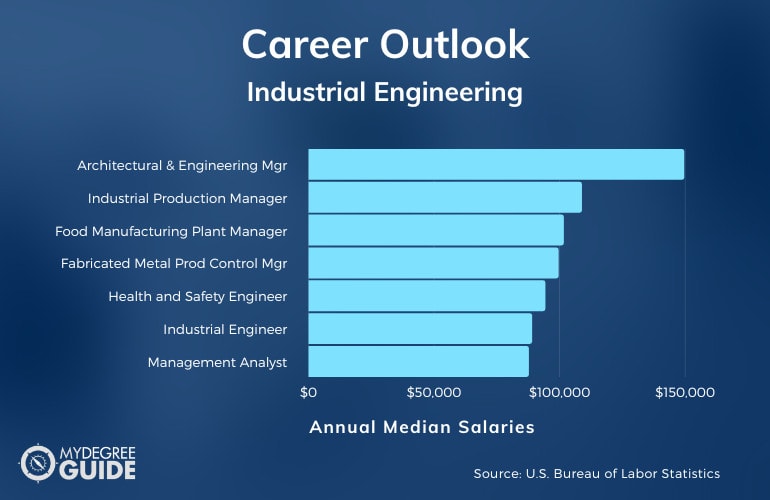When it comes to job security, you can’t do much better than a job that’s essential to every industry, right?

Industrial engineers are highly in demand nationwide, with a projected job growth rate of 10% over the next ten years (Bureau of Labor Statistics), more than double the average.
Editorial Listing ShortCode:
If you want a future in a steady industry, now would be a great time to consider becoming an Industrial Engineer. And with some schools starting to offer the qualification online, an online degree in Industrial Engineering can be a great opportunity for you.
Online Industrial Engineering Degrees

Industrial engineers are, in short, people who make processes work better. They observe activities in factories, offices and manufacturing plants, and figure out ways to change processes to make things run efficiently.
There are very few schools that offer online degrees in Industrial Engineering, either a Bachelor’s in Industrial Engineering or a Bachelor’s in Industrial Engineering Technology. At present, there are only two or three. You might find a Bachelor of Applied Sciences online, which can open many similar opportunities for you.
While many industrial engineers have a degree in industrial engineering, some of them may have actually studied degrees in other engineering fields.
Many online engineering degrees can enable you to work as an industrial engineer, but none can equip you quite as well for the job as industrial engineering, which includes social science and management aspects in coursework.
A very similar qualification is “Systems engineering”, which is essentially the same as Industrial Engineering. Some colleges combine them, and offer “Industrial and Systems Engineering”.
Editorial Listing ShortCode:
The difference between the systems engineering and industrial engineering is:
- Systems Engineers are focused on optimizing systems which could include software systems or data systems
- Industrial Engineers focus on optimizing industrial processes
These differences only really come to the forefront at the Master’s level, and the two undergraduate programs are very similar, allowing you to do many of the same things.
You might also find degrees called “Industrial Organization Engineering”, or “Industrial Automation Engineering”. These qualifications can help enable you to work as an industrial engineer, but have slightly different focuses – for example, automation of industrial processes which is quite a big consideration these days.
The bottom line: many different types of online engineering degree programs – from mechanical engineering online degrees to civil engineering online degrees – can enable you to work as an industrial engineer.
However, since industrial engineering includes a social science aspect and a management focus, a degree in industrial engineering is recommended (or industrial and systems engineering) if this is the career route you wish to follow.
Industrial Engineering Careers and Salaries

While industrial engineering is a single degree program, it can help pursue work in literally any industry where a process is followed to make a product. You will find roles in management – since the skills of an industrial engineer cross over with management skills – logistics, quality control and even cost estimation.
Here is a table of some of the roles and their current salaries , according to the Bureau of Labor Statistics:
| Careers | Annual Median Salary |
| Architectural and Engineering Manager | $149,530 |
| Industrial Production Manager | $108,790 |
| Food Manufacturing Plant Manager | $101,580 |
| Fabricated Metal Production Control Manager | $99,510 |
| Health and Safety Engineer | $94,240 |
| Industrial Engineer | $88,950 |
| Management Analyst | $87,660 |
| Machinery Manufacturing Engineer | $84,780 |
| Occupational Health and Safety Specialist | $76,340 |
| Cost Estimator | $66,610 |
With all those great options, a bachelor’s in industrial engineering seems very promising from a careers point of view. Plus, this degree will set graduates up for potentially pursuing a master’s degree down the road such as an online master’s in engineering management.
Choosing an Online Bachelor’s in Industrial Engineering Degree

When you are choosing a school for your online Bachelor’s in Industrial Engineering, there are some important questions to consider.
Firstly, Industrial Engineering is a course with a strong practical component, so very few schools are actually accredited to offer the degree completely online. Read the website carefully to make sure you won’t have to spend some time on campus, too!
Editorial Listing ShortCode:
Also, there are very few colleges that offer online Industrial Engineering degrees. If you are considering an overseas college, make sure to check if the college is accredited. Below, we summarize some important considerations.
- Accreditation: be sure to choose an accredited college. This is very important, since industrial engineering requires a “hands-on” component, so very few schools are accredited to offer an online degree program that doesn’t need some time at the school itself.
- Program Direction: Industrial engineering is broad, and, with many colleges having specific focuses, it’s worth checking out which courses will be offered in your degree. As an example, a degree in Industrial Automation Engineering will, naturally, focus on process automation.
- Residency Requirements: Will you need to actually attend the school for some hands-on procedures, or is the course 100% online? And what about laboratory work or assignments?
Finally, check out the website of your desired college or university and make sure that your computer has the specifications you’ll need to be able to attend the courses online.
Industrial Engineering Curriculum and Courses

Industrial engineers need to study a mix of Math and Physics courses, as well as Social Science courses. Essentially, you need to know how to optimize a system in the mathematical sense, and you need to understand how physical and sociological systems work.
The courses that can help you to do this include:
- Calculus: A typical first-year Math course, Calculus is about understanding how one variable changes related to other variables.
- Linear Algebra: Another essential Math course, Linear Algebra deals with systems of linear equations, matrices and vector spaces. Required to get the hang of modern geometry and physics concepts, and absolutely necessary for optimization.
- Differential Equations: An essential topic for physicists and engineers, Differential Equations is related to calculus, as it deals with functions and their rates of change. The whole of Mechanics is about how one thing changes related to another, so this is an essential course.
- Physics courses (Mechanics, Kinematics): These are necessary courses for understanding and predicting how physical things like machines work.
- Materials Science courses: These are courses designed to help you understand the role of materials – for example industrial materials and catalyzers – function in a system.
- Sociology courses (Human Factors, Industry and Sociology): In Industrial Engineering, you’ll need to understand how people work together, and this is the place to find out!
- Chemistry: Essential for understanding industrial processes like refinement of oils and petrol or creation of chemical products from pharmaceuticals to clothes.
- Industrial Structures: This course is designed to help you understand industries and how they work.
- Management: Essential for understanding how to organize and manage a system.
- Logistics: This course is all about how stuff (work, products, supplies) gets from its point of origin to its point of use. A course in Logistics can help you learn how to get something from A to B most effectively.
Admissions Requirements

Admissions requirements for your online course should be about the same as the admissions requirements for your college if you attended it in person. Generally, engineering programs require good grades in Math and Science subjects.
Check the website of your chosen school, or email the program coordinator if you need to gain some more information.
Also, be sure to check whether your online program needs you to have obtained some lower division courses in Math before you start. Some colleges want their students to come prepared to the online program with a few basic courses already completed.
Accreditation

Accreditation – or whether your degree will be recognized – is an incredibly important consideration for choosing an online degree. In order to check if your college is recognized, you can explore the CHEA (Council for Higher Education Accreditation) website.
Editorial Listing ShortCode:
A particular accreditation for engineering courses is the ABET accreditation. This is an important one to check out, especially if you are considering an online course or a course offered by an overseas university.
Financial Aid and Scholarships

Financial aid is usually offered by most colleges, and their offerings also apply to online students. Check the financial aid options at your college of interest to find out more about this.
Also, there are separate scholarships available from, for example, the Institute of Industrial Engineering. Many companies may also offer financial aid for students wishing to become Industrial Engineers (like Emmerson), so be sure to do some careful searching.
Industrial Engineering is a STEM field, and there are also many scholarships aimed at students in these fields, particularly intended for minority groups in STEM. It would be worth checking out if there is an option to fit you.
What Can you Do with an Industrial Engineering Degree?

Industrial engineering can equip you for a range of roles, from Quality Control to Logistics. You might work as an Industrial Engineer, or in one of many roles, like those listed here (according to the BLS).
- Industrial Production Manager
- Management Analyst
- Logistician
- Cost Estimator
- Facility Planner
As an industrial engineer, you have the potential to work in many industries, such as manufacturing plants to warehouses or stores, an office, a laboratory making pharmaceuticals, a refinery for chemicals, or a non-profit or healthcare provider, just to name a few.
Every industry needs help to run more smoothly, and that’s your job, as an industrial engineer.
Industrial engineers might develop new processes in a factory, decide what roles are most suitable for handicapped personnel, help to plan or locate a new facility or even help make management plans for space-flights!
Anywhere that processes happen and need to be optimized, you can be sure to find industrial engineers working.
How Much Does a Bachelor’s in Industrial Engineering Cost Online?

In terms of credit hours, a Bachelor’s in Industrial Engineering online costs around the same as most online Bachelor’s degrees. The lowest cost runs around $350 per credit hour and the highest cost is around $660 per credit hour.
Remember to check out the university website and learn more about financial aid.
How Long Does it Take to get an Online Bachelor’s in Industrial Engineering?
It isn’t usually possible to complete a Bachelor’s in Industrial Engineering completely online, because of practical projects and requirements. However, there are colleges who offer a “2+2” program (a completion of the final two years online, with minimal on-campus time), and some who offer fully-online options.
Given this requirement, it isn’t possible to accelerate the time much, and the degree will probably take as long as if you participated fully on campus. If you follow a traditional 16-week semester, and attend full-time, it should take 4 years. If you find a fully online option, you might be able to accelerate the time to three years.
Is Industrial Engineering a Good Major?
Industrial engineering is an awesome major for anyone who is fascinated about how things work and who loves to make things better!
Editorial Listing ShortCode:
If you enjoy Math and Science, but you also love machines and processes and find fulfilment in working with people, making things better and managing systems, this is a field you would probably be really suited to. And with great projected job growth, this could be a very good field to get into for your future as well.
Is Industrial Engineering in Demand?
Yes! Industrial engineers are in demand in every industry you can imagine, from finance to manufacturing. And the demand is growing fast! Industries become more complex and competitive every year, and so the need to employ people to make them better and simpler grows as well.
According to the Bureau of Labor Statistics, careers in industrial engineering have an exceptional projected growth rate according to the BLS, more than twice the average job growth rate.
What Type of Jobs can you get with an Industrial Engineering Degree?

Besides the role of Industrial Engineer, you can work in many fields, from data science to quality assurance. You could work as a health and safety engineer designing systems to protect the public and the environment, a consultant to business, or a planner for facilities like hospitals.
Some Industrial Engineers nowadays are entering data analytics and banking! So, there are many possibilities for you.
Can you become an Industrial Engineer Online?
This is a good question. At present, the answer is a very tentative yes – there are just one or two accredited schools where you can study an Industrial Engineering degree 100% online.
However, there are more options from colleges who offer the final two years online, or who offer a partially-online course, with requirements of a month of on-campus time. You could consider studying a Bachelor’s in Applied Science, which is available online and can open up many similar (but not identical) roles.
What Degree do you need to be an Industrial Engineer?

It’s possible to become an Industrial Engineer with a degree in many different types of engineering. You could hold this job title with the following degrees:
- Mechanical Engineering
- Electrical Engineering
- General Engineering
- Systems Engineering
- Industrial Engineering Technology
- Industrial Organization Engineering
- Industrial Automation Engineering
While all these qualifications can lead to a career in industrial engineering, it would be best to choose a degree that will give you the balance of management and social knowledge.
What’s the Difference Between Industrial Engineering and Mechanical Engineering?
Mechanical Engineers design, analyze, manufacture and maintain mechanical systems. Industrial Engineers design, analyze, manufacture and maintain industrial processes. Many of the skills required – being able to optimize a system, understanding how machinery and equipment works and analytical thinking – are required in both fields.
Editorial Listing ShortCode:
There are three major differences besides the fact that one works with machines and the other works with systems:
- Mechanical Engineers make a mechanical system better by (usually) understanding and improving the parts, so that the whole functions better. Industrial engineers improve the whole, sometimes without altering much about the individual parts. The approach is almost inside-out from how a Mechanical Engineer might go about the problem.
- Mechanical engineers optimize machines, while Industrial Engineers optimize processes, which might involve optimizing the workflow of human beings. This requires them to know about social sciences as well as physical sciences, to understand how people can best work together in an efficient way.
- Mechanical Engineers, unless they are also leading teams, don’t necessarily require much by way of management skills, but Industrial Engineers need to have many of the same skills managers will have.
While both degrees can lead to a career in Industrial Engineering, each degree offers its own unique range of career opportunities as well, and roles like quality control, industrial consulting, or logistics are better suited to a degree in Industrial Engineering.
Is a Degree in Industrial Engineering Worth it?

Yes, an industrial engineering degree is worth it for many students. The Bureau of Labor Statistics is projecting 3% job growth in architecture and engineering occupations over the next 10 years. Common Industrial Engineering careers in this field include manufacturing engineer, QA Management, and health and safety engineer.
Industry yesterday is definitely not the same as industry tomorrow (think AI and Big Data), and being an industrial engineer demands that you keep up! Industrial engineering is constantly growing and challenging those in the field, and job opportunities will grow too.
A degree in industrial engineering can open doors to job opportunities in nearly every industry possible, from manufacturing to offices, and even in healthcare and nonprofits. If you like making things better, you can expect to have a high job satisfaction as an industrial engineer.
Universities Offering Online Bachelor’s in Industrial Engineering Degree Programs
Methodology: The following school list is in alphabetical order. To be included, a college or university must be regionally accredited and offer degree programs online or in a hybrid format.

Kennesaw State University’s Bachelor of Science in Industrial Engineering provides an ABET accredited education based in critical thinking and technical insight. Students can pursue careers in the public or private sector with this online degree as they learn foundational industrial engineering principles through conferences and web seminars.
Kennesaw State University is accredited by the Southern Association of Colleges and Schools Commission on Colleges.

Lamar University provides a Bachelor of Science in Industrial Engineering. The first two years are required in-person, and the final two can be completed online. This program combines advanced mathematics and science courses with lab applications. A final, 3-day manufacturing lab in Beaumont, Texas rounds off the degree.
Lamar University is accredited by the Southern Association of Colleges and Schools Commission on Colleges.

At Liberty University, students who graduate with a Bachelor of Science in Industrial Engineering Technology are prepared for success in the public and private sectors. Students use creative thinking with engineering principles to produce industrial solutions based in performance and efficiency. This is a four-year degree program.
Liberty University is accredited by the Southern Association of Colleges and Schools Commission on Colleges.

Southern Illinois University at Carbondale’s Online Industrial Management and Applied Engineering program offers a Bachelor of Science that prepares students for a successful and challenging career.
Students master principles and elements of engineering in order to optimize and improve manufacturing systems and operations processes. A Capstone Option is available.
SIU is accredited by the Higher Learning Commission.

The University of Southern Mississippi’s Bachelor of Science in Industrial Engineering Technology offers an affordable, high quality education that prepares students for the industrial sector of manufacturing.
This ABET accredited institution provides courses in the humanities, such as communication, alongside the science and engineering courses necessary for this challenging career.
The University of Southern Mississippi is accredited by the Southern Association of Colleges and Schools Commission on Colleges.
Getting Your Industrial Engineering Degree Online

Getting a bachelor’s in industrial engineering online can certainly be challenging and engaging, but it is also likely worth the effort.
It offers you a chance to work in roles with a 10% job growth rate (Bureau of Labor Statistics), and it also offers you a chance to tackle problems that could really change the world and make life better for people.
If you are passionate about improving quality and productivity, as well as just making the world a better place, you will likely find studying a degree in industrial engineering to be a great option.

